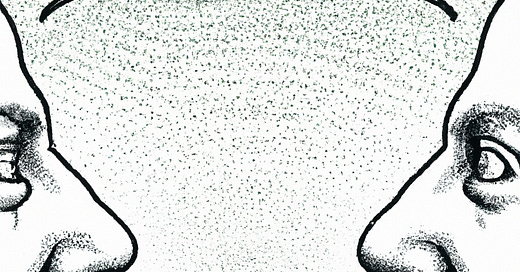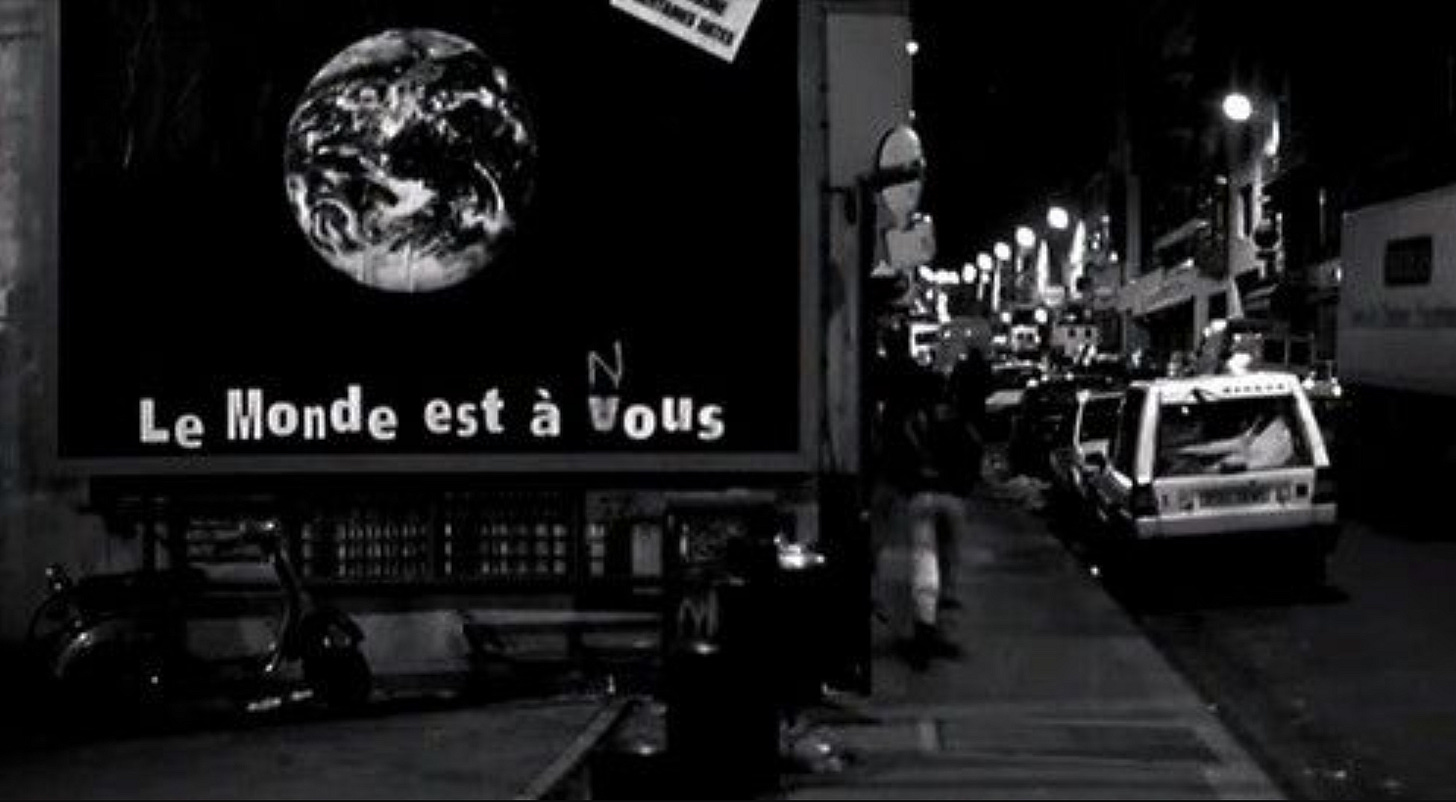The Real–But-Reeling Edition
Five minutes read of howling, followed by some primo TV series recommendations.

Dear Reader
The past is beautiful because one never realises an emotion at the time. It expands later, & thus we don’t have complete emotions about the present, only about the past.
Virginia Woolf
There’s a delay in emotions, and we don’t always recognise what they are or where they come from in the moment. On Thursday, I was walking through Russell Square in London when the news that our latest Prime Minister had resigned. I shrugged, laughed. Then tried and failed to be the first to tell a few people. As you do. Then I got on with my day.
The emotions came later. The next day perhaps… This is what living in the UK feels like…
You are on a motorway journey on a coach and realise that the driver—who has looked unwell for a few miles—is close to passing out. The bus is in the middle lane. It’s OK, you’d thought at first; the front rows were taken by a group of uniformed drivers and coach company officials. Presumably, one of them will notice the situation and guide us safely off the road, and then attend to the poor driver. We’ll all be safe.
But now you realise the coach company people are just shouting at each other. They are deranged—or maybe drunk. The disagreement seems to be about how they should keep going: whether to push down on the accelerator and hold the wheel steady, or to pull the ailing driver out of their seat quickly and have someone jump in their place. No one is considering stopping. Meanwhile, the coach wobbles into the next lane for a moment and there’s the sound of horns…
It’s been a while—but not long enough—since I’ve felt nauseous reading the news. Viscerally upset, stunned and fearful at what our politicians are up (panic) to or not up to (governing).
Lettuce hope we can move on…
Meta-losses
“How Much Trouble Is Mark Zuckerberg In?” asked a headline in The Economist this week. Like you can quantify these things…
Reality Labs, the company’s metaverse division, has so far run up losses of $27bn. Meta has sold more than 17m Quest 2 vr headsets, estimates idc, a data company, mostly at or below cost. It has also been on a hiring spree, last year announcing 10,000 new metaverse jobs in Europe. The pace of hardware development continues: on October 11th the company unveiled a more advanced Quest Pro headset, and Mr Zuckerberg showed off prototype hardware including a wrist-worn neural-input device. A Quest 3 and Quest Pro 2 are already in the works.
$27BN in year is an awful lot of loss. Especially when Meta was talking about $10BN investment over about ten years at one point.
Anyway, answer is that Mark Zuckerberg is probably in A LOT OF TROUBLE, but it doesn’t matter because he answers to no one because of Meta’s “founder friendly” share structure. If it runs out of money before virtual reality (VR) and mixed reality (XR) products become the new mobile phone—how everyone gets things done in their lives—then he loses a lot. But if it does take off—toss a coin—then he will BECOME MORE POWERFUL THAN YOU CAN POSSIBLY IMAGINE.
Hype about “the Metaverse” will ebb and flow for some time yet before we see what shape the technology takes in the world(s). Remember six months ago when we were all talking about cryptocurrency and some people thought they were going to will themselves into being billionaires?
(Don’t worry, I am not going to make a habit of shouty capitalisation in this newsletter… you know, PROBABLY.)
Life expectancy: better to be born in China (maybe)
Scott Galloway’s all about the graphs at the moment, part of the promotion of his new book, which is mostly about America. The pandemic took two years off of US citizens’ life expectancy, and means that someone living in China has on average a longer life.
Image: Life expectancy in US and China since 1960, compiled by Section4
China’s economic revolution over the past few decades lifted something in the region of 800M people out of poverty. What does not being in poverty mean? You live longer. In 1960 average life-span was about 40 years old, today its 77.1.
Here’s Prof Galloway explaining the whole thing:
The data was from the CDC (Center for Disease Control) in the US and , sourced from an article by Quartz. The data between the two countries isn’t as comparable as the chart suggests—Chinese data for life expectancy is only available to 2020 and
The UN meanwhile sees things differently, at least it did before Covid. While Chinese life expectancy has been growing since the 1960s (it was only about 44 at the start of that decade), very rapidly at first, and then steadily ever since. The UN estimate for life expectancy at birth in 2022 in the US is 79 and China 76. For comparison, a child born this year in the UK is predicted to live to 82, while Japan still leads with 85.
As with all numbers, journalists don’t let close examination of them get in the way of a good story…
This week I’ve been…
Listening to…
The second season of the Alan Partridge From The Oasthouse podcast on Audible is a dangerously addictive mental stimulant. With some serious side effects: in large doses Partridge will enter your nervous system, rewire your neural network, and it will be hard to think speak, or even read silently to yourself without you in the voice of Allan taking over. Highlights include a romance with a fellow Range Rover Sport driver, an imagining of a Norwich diaspora re-settling in east Ipswich and a friendship with “Tory Grandee” Grant Shapps (a.k.a. the Shnapster) [Note: I wrote this at the start of the week and since Grant Shapps has become Home Secretary in the UK government, but it is 50:50 that he will be by the time you read this if you don’t open your edition of Antonym before Monday. This is not satire, it is a plain statement of fact.]
Watching…
A bit of a cold saw my viewing hours creep up a little this week. So…
Dope Sick. Class A drama on Disney+, telling the story of a system of greed and private healthcare created the opioid epidemic in the US. I’m early into it, but gripped from the first episode thanks to brilliant casting, writing and a story you may know, but have probably never heard told as a piece.
Rings of Power. (Prime Video) I dragged out the viewing of the last episode. It went a bit Lord of the Rings with the ending (a lot of over-dwelling on emotional farewells) but twisted the plot just enough to make it satisfying. Production has begun on series two—ETA 2024, maybe? This is good news for a lot of people in the production business as it means some lucrative work for a little while (series one was the most expensive TV production ever).
Anxious People (Netflix). A clever-but-warm adaptation of the clever-but-warm book by Fredrik Backman, about a brief siege by a failed bank robber who apparently disappears and the attempt by two provincial policemen to find out what really happened from the hostages. Scandi without the noir (although it begins with a child witnessing a suicide).
La Haine. (Rent or buy.) This is one of the greatest films I’ve ever seen. I’ve watched it again with my daughter this week as she’s studying it for her A level French course. If it’s not the photography—that crisp, swooping black and white—it’s the script, the sound design, the ambience, the amateur actors from the Banlieue, the three exploding talents of the young lead actors. A friend reminded me the film’s self description:
“ It's about a society on its way down. And as it falls,it keeps telling itself: "So far so good... So far so good... So far so good." It's not how you fall that matters. It's how you land.”
That sent a shiver down my back. In the UK it feels like we have been falling for a while politically and economically. I’m hoping we can land soon and well. There’s a moment when one of the trio changes an ad in a way that feels hopeful, if you want it to. Here’s the still and a clip:
Writing…
Analogies. Glutton for punishment, I am writing uncertainty for work as well as living in exquisite uncertainty.
One of the strategist’s tools for finding a way in to a complex problem is analogy. Richard Rumelt, the grandmaster of strategy, wrote in The Crux:
One of the most common tools of diagnosis is analogy—making connections to similar situations. The trick to using analogy well is access to more than one or two additional situations, to understand the logic in these other situations, and to check on how that logic maps to the current situation.
The problem is that analogies are very attractive, so you can fixate on the first one that comes to mind. Or you may have a favourite and try to apply it to everything.
I made an illustration to go with an upcoming talk about this and also as a way of staying with the idea for longer than the time it took to type the words. It started out as a sketch and then I put DALL-E 2, the AI image generator, to work. Here’s a preview:
Fun, huh?
Reading
Ducks, Newburyport. I’m sticking with it. It’s rewarding the attention. Everyday thoughts inside a head in a ordinary day, except it’s not ordinary and neither are the thoughts and… it’s actually a hard read when there’s so much uncertainty in the everyday world of the reader. But that’s the point. It has a grip on me. One of those books that really does feel like a journey for the reader.
The Secret Pilgrim, by John Le Carré. Do I like it? Reader, I am gone on it.
That’s it, mes braves…
Thank you for reading another edition of Antonym. And thank everyone who liked, shared and sent a comment or message about last week’s.
Have a great week and see you on the other side of a week where we’ll either have a prime minister or a general election or both by the end of it…
Antony






